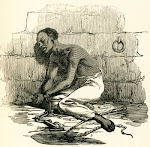 This is the second installment in a series of articles or blog entries under the rubric of black economic development, or black economic autonomy. The title I've chosen for the series pretty much sums up what I hope to accomplish, and suggests, in addition, the immensity of the task--"Pathways to a New Black Economy."
This is the second installment in a series of articles or blog entries under the rubric of black economic development, or black economic autonomy. The title I've chosen for the series pretty much sums up what I hope to accomplish, and suggests, in addition, the immensity of the task--"Pathways to a New Black Economy."To say a "new" economy is also to imply the existence--either now, or before--of an "old" one, otherwise there would be nothing to replace.
To be sure, a black economy already exists, but what I'm proposing is not a complete overhaul of the economic system now in place, but a partial departure from the old way of doing business, and a venturing headlong into a twenty-first century paradigm that will, in part, overcome one of the obvious obstacles to black economic autonomy--finding those black businesses, and professionals that are readily accessible, and to whom we can give, to a satisfactory degree, our trust, even if it's not always unqualified.
If I wait until I've researched the various topics exhaustively, these articles will never be written, and the delay, for all its emphasis on perfection, may not improve the quality of the product, but may dampen the enthusiasm with which I undertake the task. Oftentimes it's perfection that spoils the stew, and not the many hands that stir it, or the various tastebuds that seek to enhance its flavor.
Yet, for a black economy to thrive, and to have even an outside chance of growing, expanding, and becoming a force for good within the black community, a main ingredient must be added to the economic stew at the beginning--notwithstanding the number of eventual contributors to the stew, and the necessity of adding other ingredients that taste, and experience will dictate.
An economic renaissance must be predicated on one ingredient, an ingredient not totally missing now, but which, I fear, must be present in sufficient quantity to effectuate the development of conditions that would maximize the "new economy's" chances for success.
The Four Pathways to a New Black Economy establish a table of contents of a sort, an enumeration of those areas I'll explore and those topics that I'll take up:
At the outset, I not only request your candid input, but invite it, along with your suggestions, corrections, and improvements. As much as is possible, let's make this a collaborative effort.
The Main Ingredient
The Indispensable Factor
The New Way
The "Old" New Way
The Main IngredientThe Main Ingredient constitutes the First Pathway to a New Black Economy, and, in many ways, stands out as the most important. That's why I call it the main ingredient: to stress it's importance, and highlight why it's first in line to be discussed, although it doesn't contribute materially to the New Black Economy.
With this necessary ingredient in mind, I said in the comment section of an earlier blog entry:
This period of economic sluggishness has within it innumerable opportunities as well, opportunities that we're (as Greg L would describe it) not "prepared" to exploit.
I will, at some point, present my vision for economic growth within, and development of, the black community, if we can develop, and then harness, an essential element.
With this element we can look to a bright economic picture, and, without it, a bleak one, or, at the very least, a picture that will take incredibly longer to change colors--from a black and white negative, to one filled with vibrant colors: the way that Technicolor motion pictures excited the sense of sight after years of [us] viewing on screens various shades of black, and gray.
The use of the words, the element, and the ingredient, are just two ways of referring to the same thing--an essential something that's present, but not always consistently, in the affairs of men and women, not just black men, and women. Yet, it's an ingredient that's paramount, if blacks are to cultivate the necessary environment where honesty leads, and is well out front, as we come together to forge, and formulate, a New Black Economy, and lay the foundation for a brighter economic future.
Recently, someone asked me: "What does honesty mean to you?"
Only one word came to mind, not a full comment, not a thought-out philosophical response, not even a dictionary meaning. Just one word:
TRUST.
Trust is the element, the ingredient upon which a New Black Economy may be built--as well as nation states--and form the basis upon which all enterprises may flourish, provided people of goodwill have developed the will to put the good first.
Without trust, an enterprise, no matter how well-intentioned, no matter what good marks its purpose, is doomed from the beginning. Because trust is so elusive in business, and still so essential to the success of an enterprise, it has to be built-in, as it were, to exist as an integral part of the business model--that is, business transactions must be scrupulously monitored, and dishonesty meticulously rooted out--how, exactly, will become clearer, as the discussion progresses.
Ours is an age where greed has replaced trust; an age where the withholding of information is commonplace, and deception reigns, so that the unwary may be preyed upon, and the trusting fleeced. Ours is the age of Bernie Madoff, and Wall Street shysters. Trust, if it were a commodity, would be rarer than diamonds, and more precious.
Greg L summarizes it this way:
"[A]t the bottom of our nation’s economic and political problems is this focus on 'making money' rather than helping and giving to people. Greed is the scourge of the earth."
Indeed, it is. I will revisit this "ingredient" along the way--and certainly in the last installment. The last installment, hands down, will be the most controversial of the Four Pathways to a New Black Economy.
Now to prepare us, to give us a working background, I'm appending here several observations about the current state of the black economy. It's not a comprehensive overview, but it will, for now, suffice.
"Overview (Demographics): In July 2008, 41 million people in the United States, or 13.5 percent of the civilian noninstitutionalized population, were Black. They are the second largest minority population, following the Hispanic/Latino population. In 2007, the majority of Blacks lived in the South (56 percent), while 34 percent of white population lived in the South. The ten states with the largest Black population in 2008 were New York, Florida, Texas, Georgia, California, North Carolina, Illinois, Maryland, Virginia, Michigan. Louisiana is no longer in the top 10, as a result of the Hurricane Katrina disaster. Combined, these 10 states represented 59% of the total Black population. Of the ten largest places in the United States with 100,000 or more population, Gary, Indiana has the largest proportion of Blacks, 83%, followed by Detroit (82%).
Educational Attainment: In 2007, as compared to Whites 25 years and over, a lower percentage of Blacks had earned at least a high school diploma (80 percent and 89 percent, respectively). More Black women than Black men had earned at least a bachelor's degree (16 percent compared with 14 percent), while among non-Hispanic Whites, a higher proportion of men than women had earned at least a bachelor's degree (25 percent and 24 percent, respectively), in 2006.
"Economics: According to the 2007 Census Bureau report, the average African-American family median income was $33,916 in comparison to $54,920 for non-Hispanic White families. In 2007, the U.S. Census bureau reported that 24.5 percent of African-Americans in comparison to 8.2 percent of non-Hispanic Whites were living at the poverty level. In 2007, the unemployment rate for Blacks was twice that for non-Hispanic Whites (8 percent and 4 percent, respectively). This finding was consistent for both men (9 percent compared with 4 percent) and women (8 percent compared with 4 percent).
"Insurance Coverage: In 2007, 49 percent of African-Americans in comparison to 66 non-Hispanic Whites used employer-sponsored health insurance. Also in 2007, 23.8 percent of African-Americans in comparison to 9 percent of non-Hispanic Whites relied on public health insurance. Finally, in 2007, 19.5 percent of African-Americans in comparison to 10.4 percent of non-Hispanic whites were uninsured."










